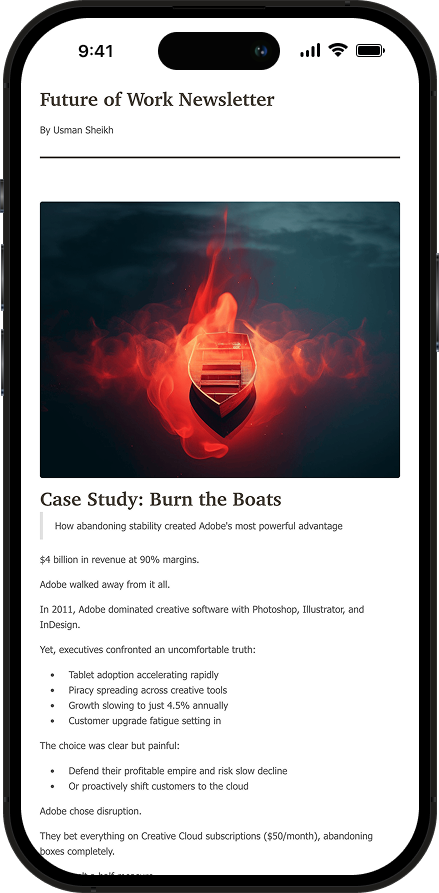30 Mar 2025
The Discipline Paradox
Why the most disciplined companies often fail first
The disciplined outperform the talented.
But not for the reasons most think.
Most people chase the wrong type of discipline entirely.
Two types exist and only one creates lasting advantage:
Rigid Discipline (The Trap)
→ Perfects systems until they break
→ Crumbles when conditions change
→ Mistakes method for principle
→ Creates the illusion of strength
Adaptive Discipline (The Edge)
→ Bends without breaking
→ Preserves principles while evolving methods
→ Thrives amid uncertainty
→ Compounds advantage over time
Netflix vs. Blockbuster showcases this perfectly.
In 2000, Blockbuster dominated with 9,000 stores and $5B revenue. They declined buying Netflix for $50M.
Their CEO famously declared: "Neither RedBox nor Netflix are even on the radar screen in terms of competition."
Blockbuster perfected rigid discipline:
→ Optimizing inventory for physical DVDs
→ Maximizing late fees (16% of profit)
→ Standardizing everything across locations
→ Dismissing digital as irrelevant noise
Netflix mastered adaptive discipline.
While their DVD-by-mail business thrived in 2007, Netflix began heavily investing in streaming, cannibalizing their own model before anyone forced them to.
This single decision changed everything:
→ Kept core principle: entertainment access
→ They abandoned their physical delivery method
→ They sacrificed immediate profit for future relevance
→ They disrupted themselves before competitors could
The results speak for themselves:
→ 2010: Blockbuster bankrupt
→ 2025: Netflix has a $400B marketcap
The difference wasn't technology, talent, or timing.
It was the courage to distinguish between what must never change and what must constantly evolve.
Blockbuster confused their method (stores) with their mission (access to entertainment).
Netflix understood the difference.
The most dangerous threat isn't your competition.
It's your successful system becoming obsolete. We are seeing signs of this every where today with the rise of disruptive technologies.
The key questions for to ask yourself are:
→ What method are you perfecting instead of reimagining?
→ Where are you confusing your principles with your practices?
→ Would you have the courage to cannibalize your own success?
Rigid discipline guarantees eventual failure.
Adaptive discipline creates lasting advantage.
The disciplined still outperform the talented – but only when they master the right type of discipline.
